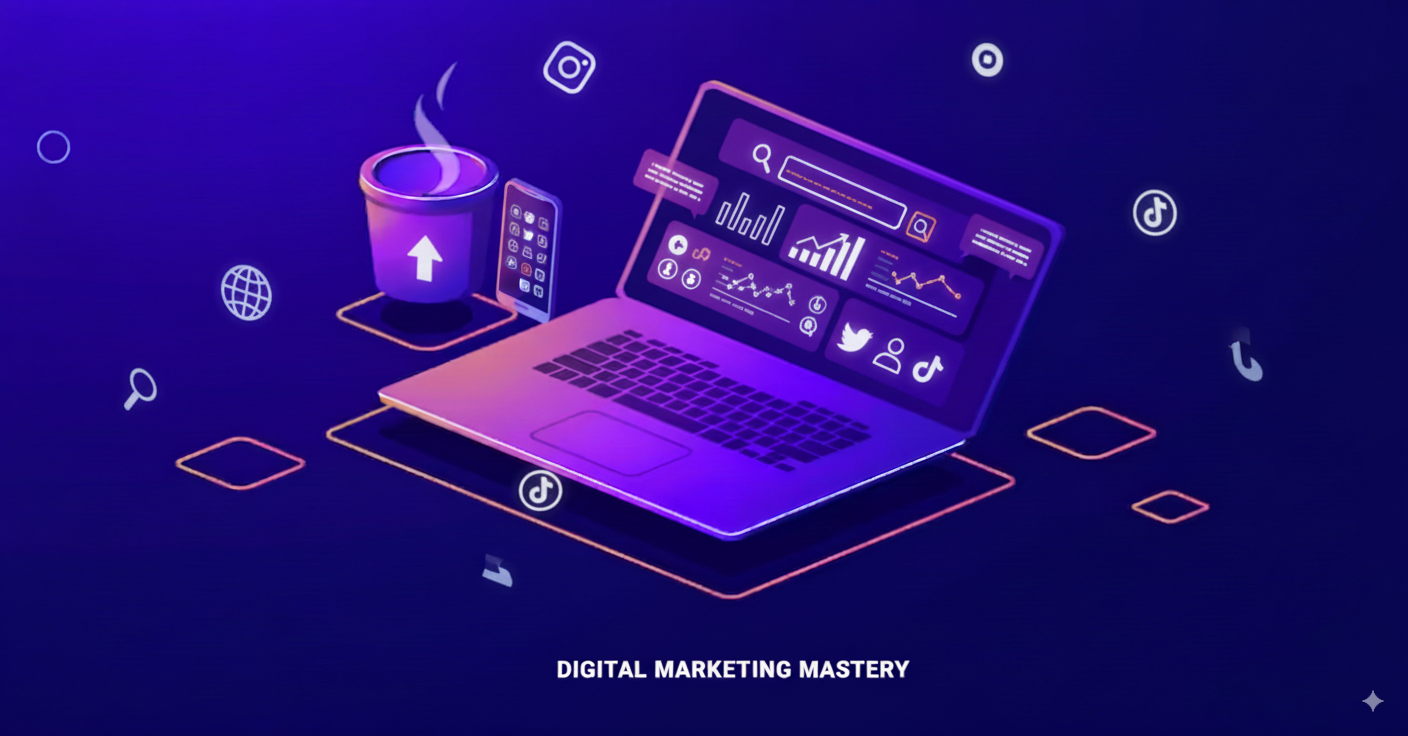
Welcome to our Digital Marketing course
Digital marketing, often called online marketing, is the practice of using digital technologies and platforms to promote products, services, or brands and engage with potential customers. This includes channels such as search engines, social media, email, websites, and mobile apps. Unlike traditional marketing (e.g., print ads or TV commercials), digital marketing allows for interactive, targeted campaigns that can be adjusted in real time based on user behavior and data insights. It emerged in the 1990s with the rise of the internet and has evolved with advancements like smartphones and social platforms.
Why Learn Digital Marketing?
Digital marketing is one of the most in-demand skills today, helping both professionals and businesses grow in the online world. It allows companies to reach a wider audience at a lower cost compared to traditional marketing. With skills like SEO, social media, and online ads, you can create strong brand visibility and generate sales effectively. It also opens doors to flexible career opportunities such as freelancing, remote work, or even starting your own agency. Learning digital marketing gives you a future-proof skill that is valuable across all industries.
Here are the benefits of learning Digital Marketing:
- High career opportunities in different fields like SEO, social media, content, and advertising
- Helps businesses grow by reaching a global audience and increasing sales
- More cost-effective and measurable than traditional marketing methods
- Flexibility to work remotely, freelance, or start your own agency
- A future-proof skill that is useful across all industries
What You Will Learn:
- Introduction to Digital Marketing - Digital marketing is the promotion of products or services using online platforms. It helps businesses reach a targeted audience through channels like search engines, social media, and email. The goal is to build brand awareness, generate leads, and drive sales.
- SEO Mastery: On-page, Off-page, Technical SEO - SEO (Search Engine Optimization) helps improve a website’s visibility on search engines. On-Page SEO optimizes content, titles, and keywords, while Off-Page SEO builds authority through backlinks and sharing. Technical SEO ensures site speed, mobile-friendliness, and proper indexing for better rankings.
- Google Search Console - A free tool by Google that helps monitor and maintain website presence in search results. It shows issues like crawl errors, keyword performance, and indexing status. It helps in improving SEO and troubleshooting website visibility problems.
- Google Analytics - Google Analytics tracks and reports website traffic, showing where visitors come from and how they interact with the site. It provides insights into user behavior, demographics, and conversion goals. Businesses use it to make data-driven marketing decisions.
- Meta Business Suite - A tool by Meta (Facebook) to manage Facebook and Instagram business accounts in one place. It allows scheduling posts, running ads, and tracking insights. This helps businesses manage content and reach their audience effectively.
- Canva (Poster Designing) - Learning Canva designing is important in digital marketing because it helps create attractive visuals quickly without needing advanced design skills. Good posters, social media posts, and ads grab audience attention and improve engagement. It also saves time and cost, making marketing campaigns more effective and consistent.
- E-mail Marketing - Email marketing involves sending promotional or informative emails to a targeted list of subscribers. It helps build customer relationships, nurture leads, and drive sales. Personalization and automation make it more effective.
- Search Engine Marketing - SEM uses paid advertising on search engines to drive website traffic. Ads appear on top of search results when users search for specific keywords. It provides quick visibility and measurable results for businesses.
- Social Media Marketing - SMM promotes products or services using platforms like Facebook, Instagram, LinkedIn, and Twitter. It includes paid ads, influencer collaborations, and organic engagement. It helps build brand presence and connect directly with the audience.
- Content Writing and Content Management - Content writing focuses on creating engaging and informative text for blogs, websites, and social media. Content management involves planning, organizing, and publishing content consistently across platforms. Together, they ensure a strong and relevant digital presence.
How This Course Works:
- Rapidd Academy’s Digital Marketing course teaches you how to promote products and services online using various platforms. It begins with the basics of SEO, content, and social media to build a foundation. You’ll learn to use tools like Google Analytics and Meta Business Suite to track and manage campaigns. Practical training in email marketing, SEM, and SMM will help you implement real strategies. The course focuses on both organic and paid methods to reach the right audience.
- The Digital Marketing course is ideal for students and recent graduates who want to launch a career in the digital field. Entrepreneurs and business owners can use it to promote their products or services online. Marketing professionals can join to upgrade their skills with modern strategies. Freelancers can learn to offer digital marketing services independently. Anyone interested in growing a personal or professional brand can benefit from this course.
Who Can Take This Course:
Takeaways from the Program
- Gain a clear understanding of SEO, SEM, SMM, and email marketing strategies.
- Learn to use tools like Google Analytics, Search Console, and Meta Business Suite.
- Be able to design creative posters and ads using Canva.
- Develop skills to plan, execute, and analyze digital marketing campaigns.
- Build confidence to grow a brand, business, or career in the digital space.







